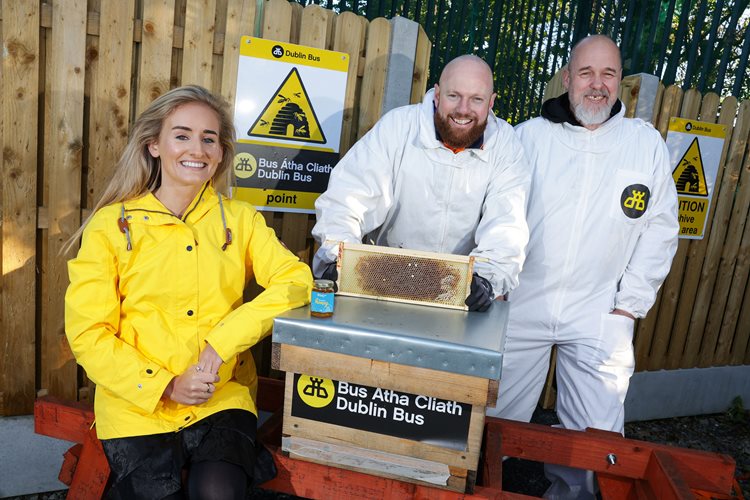The ‘Dublin Buzz’ initiative was set up in 2021, starting at our depot in Phibsboro. Over 50,000 native black bees are now inhabiting a small patch of previously unused land nestled in the back of the depot. The lilac bushes along the perimeter boundary and wildflower planting around the hive have provided the native black bee with sufficient pollinating needs ensuring a Lifecyle approach to the project.

Following the success of the first beehive in Phibsboro, Dublin Bus expanded the initiative, and in 2022 we installed a second beehive on another section of unused land at our Broadstone Depot. Our depots will now be home to up to 150,000 bees during the summer months.
Two Dublin Bus employees with extensive knowledge in Beekeeping are currently leading the project and maintaining the beehives at the Broadstone and Phibsboro depots. They managed the harvest of approximately 80 pots of honey in 2021, and over 200 pots from both the Broadstone and Phibsboro hives in 2022.
In conjunction with the installation of the second beehive in Broadstone, two more employees were trained up to assist our beekeepers in the maintenance of the hives, showing our commitment in educating employees and raising awareness of the crucial role bees play in biodiversity.
This project aims to encourage biodiversity by supporting a wide variety of native bees and plants, while also trying to combat the threat to native black bees due to hybridisation with non-native strains of honeybees. These pollinating insects are imperative for preserving ecological balance and biodiversity in nature. Studies have shown that beehives in urban areas produce healthier and productive bees, thanks to greater biodiversity and less pesticide exposure.
The Dublin Buzz initiative is a commitment to celebrate our people and their passions and commitment to a more sustainable future. We aim to introduce similar initiatives in other locations to promote biodiversity back into the city, while simultaneously creating employee awareness of the importance of biodiversity in urban areas.
